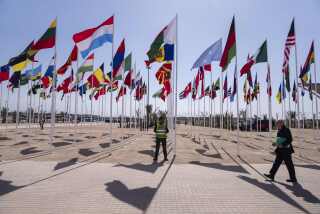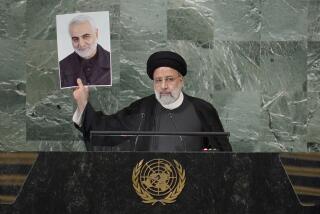IMF Blunders Through Asia, Leaving Disaster in Its Wake
- Share via
It is now widely recognized that the International Monetary Fund has actually worsened the Asian economic crisis; in fact it is difficult to find an economist outside the government or the IMF payroll who will defend its recent actions. As the misery and frustration spread throughout the area, expressions like “IMF riots,” “IMF survival crimes” and “IMF suicides” have become a part of the regional vocabulary.
In Indonesia, the rioting began after the IMF forced sharp increases in the price of fuel. But these price hikes, which were the last straw for many poor and working people already hit hard by falling real incomes and spiraling unemployment, were just the latest footprints in a trail of IMF blunders.
The most destructive error was to impose austerity--economists’ jargon for the high-interest rates, spending cuts and layoffs that send an economy into a recession. That turned what began as a financial crisis into a crisis of the real, underlying economy.
This is especially clear in South Korea, whose underlying economy was the strongest. The Korean private sector had piled up too much short-term international debt, which left the economy vulnerable to a financial panic when the currency began to decline against the dollar. When the domestic currency falls, it makes the debt service on foreign loans more expensive. Debtors then sell domestic currency for dollars, which sends the currency down further, which makes debt service even more expensive, and the spiral continues. South Korea eventually stabilized the situation by reaching an agreement with foreign banks to roll over--that is, extend the duration of--their loans. It’s not clear that the IMF contributed much to this result, other than making sure that the banks--including our own Citibank and Chase Manhattan--didn’t have to take any serious losses. On the other hand, the IMF did cause a lot of unnecessary suffering with its forced austerity: South Korean unemployment is expected to hit 12.5% this year, up from 2.5% last year.
This could well provoke a political crisis in South Korea, a country in which big companies traditionally have provided steady employment, and which has no social safety net for the unemployed. The IMF has insisted on introducing mass layoffs, on the grounds that this will make the Korean economy more “efficient.” But it is not clear that throwing people out on the street is more efficient than reemploying them elsewhere within a large firm or conglomerate, as has been done in the past. South Korea’s per capita economic growth rate of more than 7% a year over the past 30 years--among the highest in world history--indicates that its form of capitalism is not altogether “inefficient” in its allocation of capital and labor, however corrupt and dictatorial it has been.
A confidential IMF memo leaked to the New York Times last January admitted that the fund’s policies had worsened the crisis in Indonesia’s banking system. Even worse, the IMF’s “bailout” package has neglected to do the single most important thing that it could do to stabilize the Indonesian economy: arrange a rollover of the more than $65 billion in short-term foreign debt owed by Indonesian companies and banks. Until this is done, much of the Indonesian economy will be unable to recover due to lack of foreign credit for essential imports.
Ironically, one of the effects of the IMF’s regional economic destabilization may have been to help topple the Suharto dictatorship. This will not be the first government that was brought down by its adherence to IMF “reforms.” If the fund really wanted to promote democracy, there are more direct means than depressing people’s living standards until they take to the streets. It could condition its aid on the holding of elections, the release of political prisoners or an end to Indonesia’s occupation of East Timor--measures it has refused to consider.
The Clinton administration has proposed increasing the IMF’s funding by 45%, or $18.5 billion. This massive increase almost sailed through Congress without any debate after its proponents cynically attached it to American disaster relief in the Senate. But a real debate over what this secretive institution actually does is badly needed, as its victims in Asia and throughout the world surely can attest.
More to Read
Sign up for Essential California
The most important California stories and recommendations in your inbox every morning.
You may occasionally receive promotional content from the Los Angeles Times.













